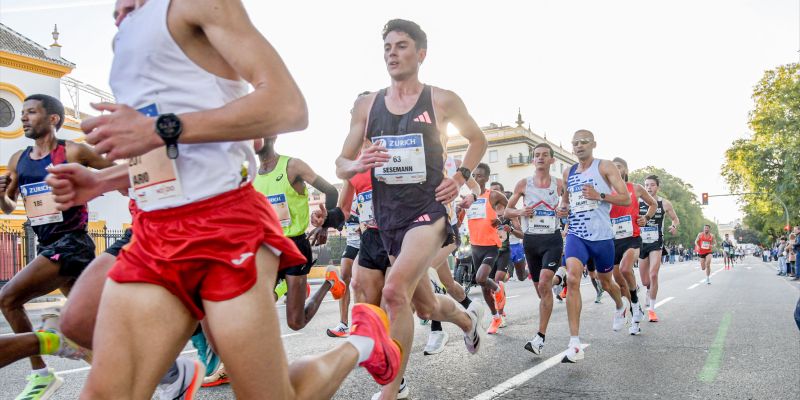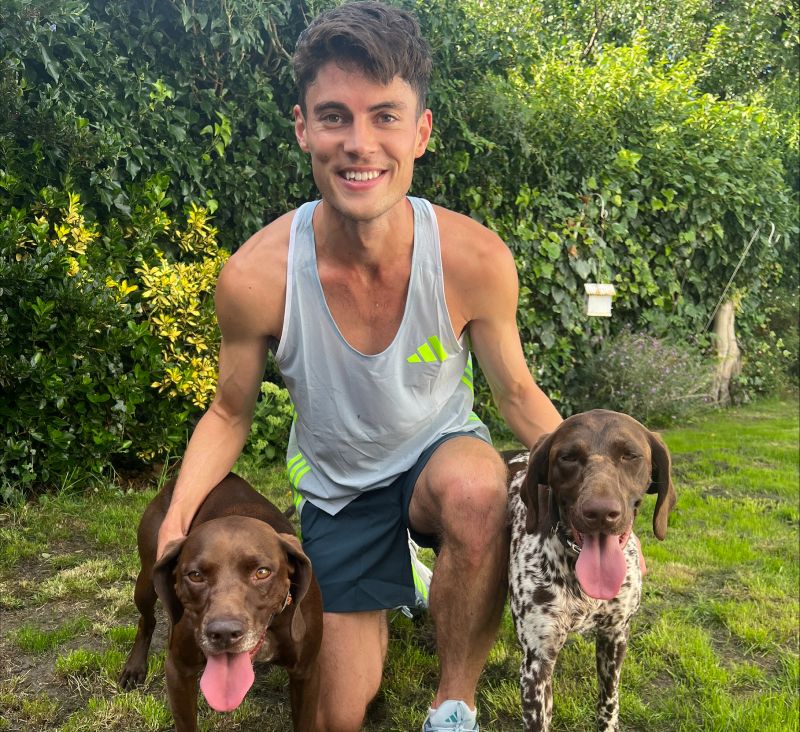
After 13 years of training in Leeds and racing for the city, Phil Sesemann qualified for the Paris Olympics in 2024 and became the third fastest British marathon runner ever.
As a student, Phil Sesemann (Medicine 2017) would run from Hyde Park, up Otley Road to Headingley and back via Queenswood Drive. It was a “terrible route” which had him dodging wheelie bins, traffic and Otley Run enthusiasts. But it was also an escape from study, and the rigours of a medicine degree.
Things are a little different 13 years on. He’s given up his medical license to run full time. He’s found a more scenic route – still in Leeds – and pounds the towpath of the Leeds-Liverpool Canal. He’s also completed the Seville marathon in 2:08:04, writing himself into the record books and qualifying to race at the Paris Olympics in 2024. “It’s way more than I ever hoped to achieve,” Phil says. “All I’ve ever wanted is to see how fast I can be.”
The answer, it seems, is very quick.
I came down the finishing straight and the clock had frozen, so I had no idea whether I'd done it.
As we speak, Phil’s training partners are thundering about in the background. His dogs, Haile and Kipchoge, are affectionately known as the ‘Mileage Mutts' to Phil’s 31,000 social media followers, and are named after two of the great long-distance runners. They accompany Phil on many of his training runs – which is another reason he sticks to the predictable, sheep-free canal path. “When I retire from running I’ll still be jogging up and down the canal with them,” he laughs. “And I’ll probably still be trying to come top of my age category at the London Marathon each year.”
For the London-born Phil, that's the race that first catapulted him into the public eye in 2021 – his first ever marathon – when he came home as the first British runner in seventh place overall. “That was my 15 minutes of fame,” Phil remembers. “It was my first taste of treating it as a profession.” An unknown athlete to most outside of the running world, the result came as a surprise – though not to those who’ve followed his progress.
Phil has been running since primary school. His brother is a haemophiliac, so Phil was directed towards non-weight bearing exercise from a young age, and became an accomplished swimmer. It gave him a strong aerobic base for the transition to running, and success followed as a teenager – including a fourth place at the National Cross Country Championships in 2008. “But I was inconsistent,” Phil said. “I didn’t have the endurance for longer races – it took a long time to build up to marathons.”
As a student at Leeds, he tried his hand at triathlon, inspired by the London 2012 performances of fellow Leeds graduates Alistair (Sports Science and Physiology 2009, Hon LLD 2013) and Jonny Brownlee (History 2012, Hon LLD 2013), but found the training difficult to balance with his degree. Switching his focus to running, he represented England, and achieved a second place at the British University Championships (BUCS) 3000m race in his final year. “The medical school was always supportive of my sport,” he said. “But despite some good results, my performances were inconsistent. I was pretty dire at BUCS Cross Country Championships, for example.” This year, he was asked back to the championships in Temple Newsam Park, Leeds to present the medals. The announcer took great pleasure in introducing Phil as “the elite marathon runner with a best BUCS cross country result of 41st place”.
That inconsistency may have been a result of injuries – which set Phil back a number of years – and the intensity of his medical degree. After graduating, Phil worked part time as a doctor to allow more time for running. “I was very different to my colleagues in that I didn’t have much career aspiration in medicine,” he says. “They were very focussed, but I wouldn’t go home and think about medicine. I’d go home and think about running.”
His love for the sport became a secret weapon. Combined with an apparent robustness to high volumes of training, which allows him to train and race consistently over marathon distance, Phil simply enjoys what he does. “It’s cliché, but I love it. Even with bad results I’m able to get out and keep training and turning up motivated. That means I can put together years of hundred mile weeks.”

Pictured: Phil with his two dogs, Haile and Kipchoge
His dramatic marathon debut came after a disappointing year competing for Great Britain on the track, and persuaded Phil to switch his attention to the longer format permanently. He set another personal best at London in 2022, and in the 2023 edition, Phil famously out-kicked Mo Farah in a sprint finish for the line. He decided to give up his medical license in order to become a full-time runner – a move that Phil found “freeing”, allowing him to focus on running faster, and nothing else.
Phil came within seconds of the Olympic qualifying time at Valencia Marathon in 2023, and earmarked Seville 2024 as his key opportunity. He was on track to romp home under the target time until the last 3km, when his legs began to tire. “It was hell, I was getting slower, and I convinced myself I wasn’t going to make it. I came down the finishing straight and the clock had frozen, so I had no idea whether I'd done it.”
The time to beat was 2:08:10. He crossed in 2:08:04 – which was “everything” to Phil.
Paris now looms, a race in which Phil can “go in swinging” knowing he’ll be an Olympian – which is far more than he ever thought he could achieve.
He still remembers his first race win. He was eight years old, taking part in a local Bromley borough cross country run. “It was a special feeling when I won. That was my Olympics, and it was amazing.”
It started a lifelong passion for the sport – only now, he’s heading for the real thing.
Further information
For further details, email Ed Newbould, Digital Communications Officer, University of Leeds at e.w.newbould@leeds.ac.uk.